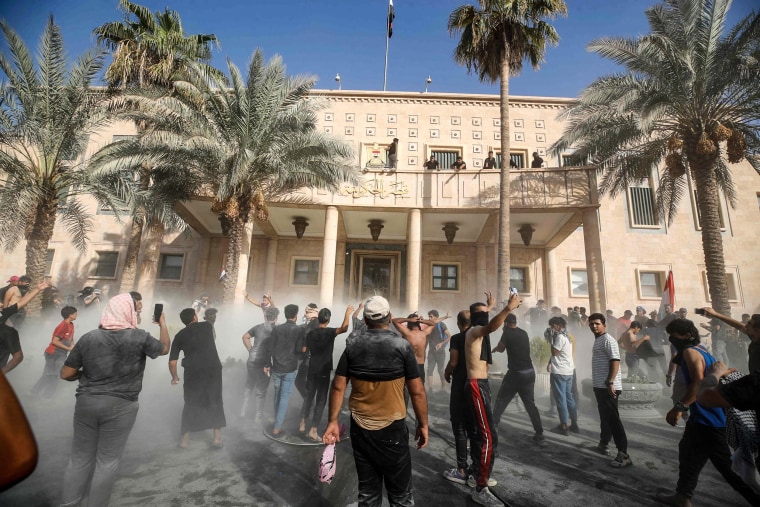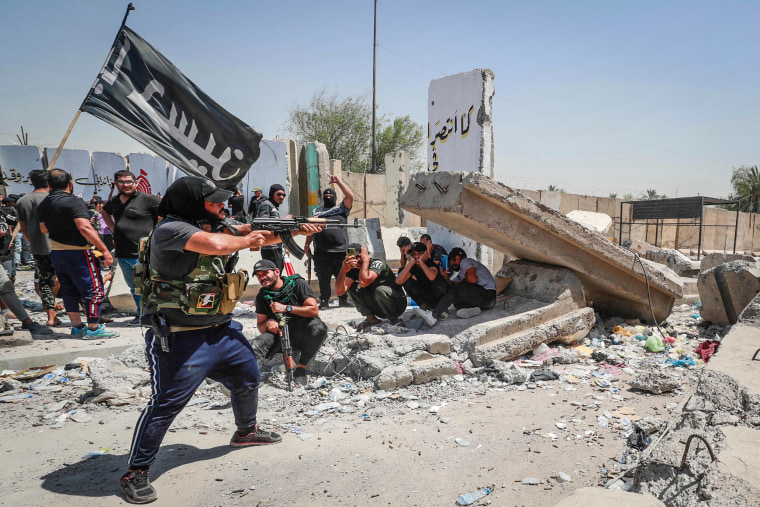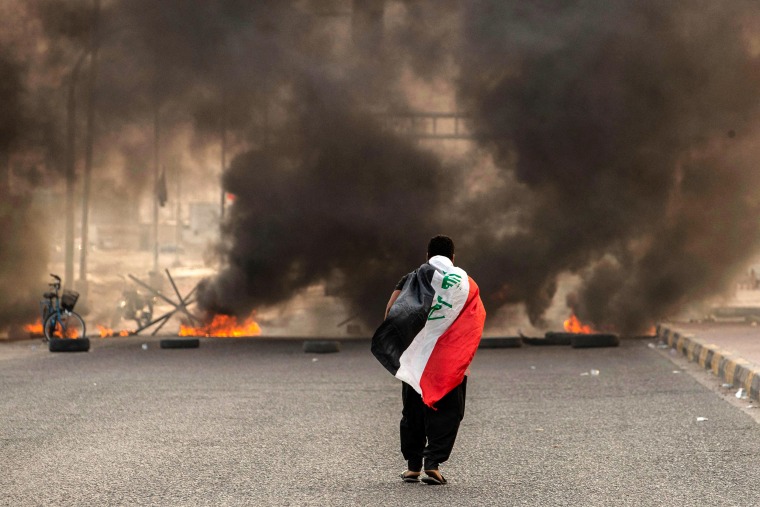Iraq descended into lethal road clashes as followers of highly effective cleric Muqtada al-Sadr traded fireplace with safety forces and fellow Shia Muslim militias, a sudden outburst of violence that adopted years of the nation fading from the worldwide highlight.
Many Americans obtained to know al-Sadr when his Mahdi Army fought pitched battles towards American troopers after the 2003 invasion of Iraq that deposed dictator Saddam Hussein. Now, he has positioned himself as a nationalist chief in opposition to militias intently aligned with neighboring Iran.
Here’s what’s been taking place and why.
What occurred?
On Monday, al-Sadr, whose social gathering gained essentially the most seats in parliamentary elections however not sufficient to type a authorities, introduced he would resign from front-line Iraqi politics after months of political wrangling.
This prompted tons of of his supporters to storm the Baghdad authorities palace, clashing with safety forces.
Al-Sadr’s loyalists pulled down the cement obstacles outdoors and breached its gates, The Associated Press reported. Many rushed into its lavish salons and marbled halls, a key assembly place for Iraqi heads of state and overseas dignitaries.


Iraq’s navy mentioned 4 rockets had been fired into town’s Green Zone, a fortified central neighborhood that homes authorities buildings and worldwide embassies. Iraqi safety forces seemed to be firing again, the AP reported from town.
In response, al-Sadr’s opponents, the Iran-aligned Popular Mobilization Forces, despatched loyalists to Baghdad’s Green Zone, “risking conflict between the two heavily armed sides,” in response to a briefing by the London think tank Chatham House.
Much of the cleric’s grassroots help comes from Baghdad’s Sadr City — which he renamed in honor of his late father. “People were in a rage, firing bullets in the air,” Mohammed Abed Hassan, 49, a highschool trainer and father of two, mentioned of the violence.
Although it’s nonetheless unlikely this can result in a Shia civil conflict, there are growing considerations in regards to the lengths Sadr is keen go to.
Chatham House suppose tank briefing
There have been reviews of as much as 30 individuals killed and 400 injured, however the authorities has not launched official figures.
Then — in a stark show of al-Sadr’s energy and affect — nearly as quickly as he mentioned the phrase “withdraw” at a news convention Tuesday, his loyalists ceased the violence.
That was strengthened when the nation’s caretaker prime minister, Mustafa al-Kadhimi, even thanked al-Sadr on Twitter, saying his name to cease the violence was “the epitome of patriotism and respect to the sanctity of Iraqi blood.”
Why did the violence begin?
The road battles are a symptom of an influence vacuum in Iraqi politics that many analysts regard as the best menace to the nation’s stability after years of conflict, civil unrest and the Islamic State terrorist group’s militancy.
Sectarian violence has been a standard theme in a rustic populated by Shia, Sunni and Kurdish groups all vying for affect and cautious of being marginalized.
But the present pressure is inside Shia groups themselves, particularly al-Sadr’s political social gathering and different Shia events backed by Iran, which nonetheless holds vital sway in Iraq.
In 2021 after al-Sadr’s social gathering’s parliamentary election victories, he additionally refused to barter with the Iran-backed events — locking Iraq in a political stalemate that has lasted one of the best a part of a 12 months.
In July, his supporters broke into the Parliament in an try to discourage these rivals from forming a coalition.
Though oil wealthy, Iraq’s has struggled for the reason that U.S. invasion and the following chaos and civil conflict. The nation’s hollowed-out financial system is affected by 14% unemployment and a creaking infrastructure that usually doesn’t ship essentially the most fundamental companies.


Many of al-Sadr’s supporters who stormed the Parliament in July and once more Monday are among the many nation’s most impoverished and blame the political elite for what they see as their marginalization.
To them, al-Sadr will revolutionize a political system they consider has forgotten about them.
“He is my leader,” mentioned Ameer Hussein, 25, a taxi driver from Sadr City. “We live in very poor conditions. Al-Sadr asked to develop services that help Iraqis to live in a better situation.”
Of the violence this week, he added, “Sometimes we have to show that we can act in order to send a message to others that they cannot neglect us.”
In actuality, far from being a disruptive outsider, al-Sadr holds vital energy and sway in Iraq’s power-sharing system.
What’s the background?
Al-Sadr derives a lot of his help from his household legacy. His father was the Grand Ayatollah Mohammed Sadeq al-Sadr, who was assassinated in 1999 for his vital stance towards Saddam.
Inside Iraq, he’s recognized for his highly effective rhetoric and speeches that usually known as for revolution and resonated with these on the mistaken facet of Iraq’s yawning monetary and sophistication divides.
To Americans, nonetheless, he’s higher referred to as one of many main opponents of the U.S.-led occupation of Iraq after the invasion in 2003, inciting protests for the troops to depart. His Mahdi Army — later renamed the Peace Brigades — clashed with coalition troops through the chaotic and violent post-invasion years.
The present turmoil exhibits his affect has not pale — if something, it has grown.


It additionally seems to be a grave concern for Iran, whose Supreme Leader Ayatollah Ali Khamenei has repeatedly known as for Shia unity and even tried to dealer dialogue with al-Sadr.
But the cleric has refused, agency in his resolve to type a authorities with out Tehran-backed troops.
It’s unclear how the deadlock can break.
“Although it is still unlikely this will lead to a Shia civil war, there are increasing concerns about the lengths Sadr is willing go to,” the Chatham House briefing mentioned. Al-Sadr’s “aim is not revolution or overturning the political system, but rather to gain more power from his Shia opponents.”


